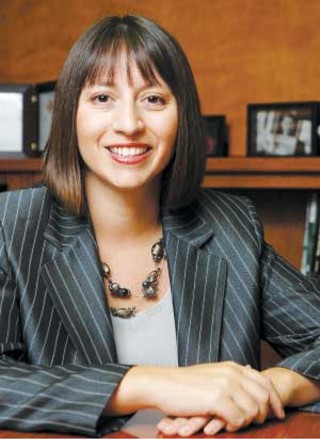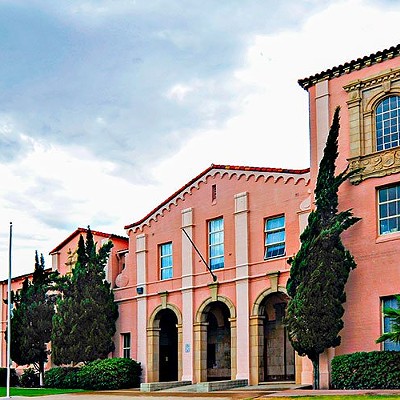But 51 percent of the voters on Nov. 4 said no--about 3,100 more people than the 49 percent who said yes.
However, the narrow defeat is not sending the supporters of the TUSD budget override running. Instead, they're planning to help TUSD access other funding sources, getting the word out that change has already come thanks to the district's new superintendent, and preparing for another possible campaign--yes, come 2009, there just might be another override on the ballot.
Override supporter Ann-Eve Pedersen, who helped start Tucson Unified School Supporters (TUSS) during the TUSD school-closure debate last spring, says Prop 403 organizers will soon meet to go over campaign successes and issues, and discuss how a new override could be presented to voters.
Pedersen expresses frustration over a last-minute campaign against the proposition that included what she calls false information. One of the final numbers to come from opponents of the proposition concerned TUSD's per-pupil spending. Pedersen says she was told that some critics claimed spending was out of control, at about $9,000 annually per student.
But according to Pedersen, an annual Kids Count report shows that TUSD spends about $7,410 a year per child, lower than the national average of $8,973 but higher than the state average of $6,232.
Critics included desegregation funds given to TUSD and Title 1 monies in their figures. But Pedersen points out that those desegregation and Title 1 funds largely go to students living below the poverty line.
Another fallacy Pedersen cites is the claim that TUSD could get extra funds by turning to parents and other family members for tax-credit funding. Critics cited more-affluent school districts like Catalina Foothills, Vail and Tanque Verde, which rely more on this funding.
"Those districts can do that. With 35 percent of (TUSD) families living below the poverty line, unlike those other districts, how can we go to our parents and expect them to donate $400 now and wait to get that back during tax time? We don't have that luxury," Pedersen told the Weekly. "... Given that we're 49th in the nation in per-pupil spending (in Arizona), there just is not enough money to provide what should be essential components of any high-quality school experience.
"There are a number of things (TUSS is) trying to do ... (like helping) find some other financial resources for the district--business types of sponsorships, more grant funding and more donations. We can no longer deny that education is being underfunded by the state," Pedersen says.
State-funding prospects are what scare Pedersen the most right now, because of a budget crisis that will force legislators to slash funding. Pedersen says certain education programs are already being discussed as possible targets for cuts, including all-day kindergarten.
"If we want a strong education system, we have to do it ourselves," Pedersen says.
Pedersen says the other work ahead for TUSS involves spreading the word about what they see as great programs and schools that are already part of TUSD, in an effort to help the district better compete against charter and private schools that are currently luring an estimated 11,000 students from TUSD schools.
Getting those students back is key to increasing the district's ever-decreasing enrollment. Pedersen and others are looking to new TUSD Superintendent Elizabeth Celania-Fagen to make that happen.
Celania-Fagen's supporters say that after only a few months on the job, she's already moving the district forward. They say she's successfully laid to rest segregation issues by offering school choice, allowing parents to send their children to any school in the district (although popular schools may end up with waiting lists). Celania-Fagen is also working to move some decision-making from the top to the bottom, by asking schools to make their own decisions in areas such as curriculum and teaching philosophy.
Other changes from the new superintendent include lifting a hiring freeze that began last year; not filling two top administrative positions (so far) that were vacated this fall; and bringing in a new finance team that made significant changes in the budget to get rid of a $20 million deficit--enabling the district to carry over $5 million from last year's budget.
It's a beginning like this that makes people like Pedersen think Celania-Fagen could be the superintendent who will finally turn around TUSD. "At this point, we have to look at recruitment and retaining kids. ... (Celania-Fagen) says it's about involving parents and making sure you are responsive to their concerns, and as a result, you keep their kids. That's encouraging," Pedersen says.
Such changes may make it easier for an override to pass next year. Part of the current struggle is overcoming the cries of critics who rely on old information and continue to live in the past, Pedersen says.
"There is so much misinformation out there about TUSD, very old information about how public-school financing works. It's not simple; it's complicated. They say, 'Tighten your belt,' but if you are already at the point where you are cutting into bone, what more do you want?"
Pedersen says critics continue to complain about the way the district was previously managed, or recall when $30,000 was stolen from a high school, or continue to express frustration that the district hired a risk manager. It goes on and on, she says.
"There were a lot of people on the other side who recognize the importance of a strong education system, and see the significant changes the new superintendent has already made. Unfortunately, too many think of the past. It will take more to change their minds," Pedersen says.
But some TUSD critics will never be won over, Pedersen admits.
"Those who said they refuse to help schools, I don't understand. We have a social compact in our country in which one generation provides for the next. Someone pays for your education, and then you pay for someone else. That person (who paid for your education) may not have liked it; they may have been on a fixed income. But you do that for the next generation, and that next generation is going to pay for your Social Security out of their paycheck."
Pedersen is far from the only person who looks to Celania-Fagen as an agent of change.
Miguel Cuevas, a 21-year-old senior public policy major at the UA, will soon become the youngest member of the TUSD Governing Board. Cuevas says what he likes most about the new superintendent is her open-door policy that makes it possible for anyone to come to her with concerns or ideas.
Cuevas says that as the district begins to wrestle with its challenges after the Nov. 4 election, he'll be watching to see how her office reacts.
"Once that door starts closing, or you begin surrounding yourself with yes people, the district will go back to the status quo," he said.
Cuevas shared this with Celania-Fagen at the November meeting of Exceptional Education Parents, a group of parents with children who receive special-education services.
Cuevas was joined by Mark Stegeman, a UA finance professor and the other new Governing Board member. In January, Cuevas and Stegeman will take the place of outgoing board members Alex Rodriguez and Joel Ireland, joining incumbents Judy Burns, Bruce Burke and Adelita Grijalva.
Some district critics have complained that past board members tried to micromanage the district, losing their focus on setting policy. This often led to divisiveness during board meetings and crises, such as the school-closure proposal last spring.
The public, however, shouldn't expect that from the new school board or the current district administration, Stegeman says. Cuevas adds that he thinks the board will want to reach consensus as much as possible, although he and Stegeman reiterate the goal isn't for everyone to always agree: The goal is to fix the district's finances and create better schools.
"There are tough days ahead," Cuevas told parents and educators at the Exceptional Education Parents meeting. "But I think change is in the air. You have new board members and a new superintendent. ... I believe we can earn your trust and respect."
Trust and respect is what some critics have said is missing--and what will be needed if TUSD supporters want to push for another override next year.
Celania-Fagen says she is well aware of the trust and respect that TUSD needs to regain from the public, which is why she dumped plans to close schools and instead chose to give schools more power to make their own decisions, and to give parents the freedom to choose what school they want their children to attend.
In the end, the fate of TUSD schools may come down to survival of the fittest. Celania-Fagen says she anticipates the district will have a better understanding of what schools are meant to stick around--and those that are not--based on enrollment. She has asked school administrators to ask themselves, "What's it like to learn here, and can you explain that to parents? Does it mean something beyond reading, writing and arithmetic?"
"(It becomes) a consumer-driven thing where we have students and families choosing certain schools, and no one choosing others, and there are probably reasons why no one is choosing that school. That makes the conversation different," she says.
As an example of what she expects, Celania-Fagen recalls a recent visit to Ochoa Elementary, one of the schools on last spring's closure list. The school has an art studio that works with students using the Reggio Emilia approach, an Italian learning method. After the tour, the principal asked Celania-Fagen to come to her office, where she gave the new superintendent a proposal to expand Reggio Emilia into all the school's classrooms.
"We're going to have to be aggressive transforming our schools into amazing places where parents want their children to be," Celania-Fagen says. "Some are already there and have waiting lists, and others are good schools but don't have the atractability that this day and age require."
So far, signs are good that Celania-Fagen intends to do whatever it takes to leave her door open to both ideas and criticism. At the meeting with parents of special-needs children, Celania-Fagen got an earful from parents of children with autism-spectrum disorders whose needs went unmet through their elementary and middle school years. She also heard from parents of children with cognitive disabilities and other disorders--parents who think it is time for TUSD to get rid of its self-contained classroom models and bring inclusion into all TUSD schools.
Rather than leaving or arguing, Celania-Fagen listened, and eventually shared a story that most parents of special-needs children could understand: a story about raising a kid who marches to the beat of her own drum. Celania-Fagen recalled when her daughter was in preschool, and the teacher wanted to talk.
During circle time, if her daughter was already involved in a puzzle or another activity, she refused to join in. The preschool teacher thought it was an issue because she wanted to prepare Celania-Fagen's daughter for elementary school; Celania-Fagen thought her daughter was acting in a developmentally appropriate manner.
"The world of education is going away from the model that compliance is good, and moving toward creativity and innovation," she said.
One parent across the room complimented Celania-Fagen.
"I like you. You are inspirational, and it's a pleasure to meet you," she told her.
On the other side of the room, however, another parent begged Celania-Fagen to get involved and visit the various self-contained special-education classrooms to understand the work ahead.
"Things need to change right now ... tomorrow. We are counting on you," the parent said.














